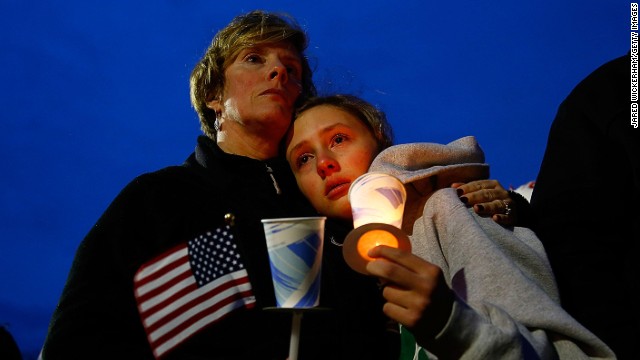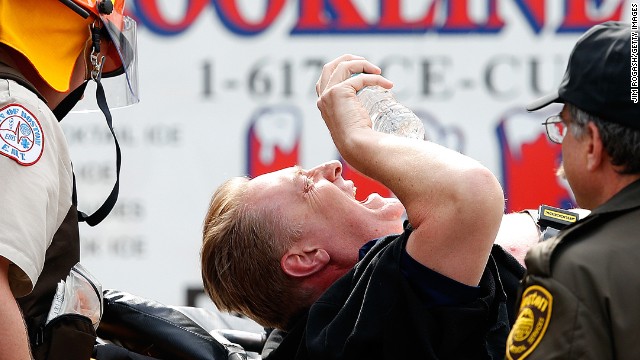(CNN) -- Within a day of the Oklahoma City bombing,
officials had named their suspect: Timothy McVeigh. Within two days of
the 9/11 attacks, investigators had zeroed in on al Qaeda as the
perpetrator.
 Photos: Nation mourns Boston Marathon tragedy
Photos: Nation mourns Boston Marathon tragedy
 Photos: Deadly attack at Boston Marathon
Photos: Deadly attack at Boston Marathon
But as loved ones mourn the deaths of three people
and dozens of others remain hospitalized from the dual bombings Monday
near the finish line of the Boston Marathon, two questions continue to
hound authorities: Who triggered the attack, and why?
On Wednesday morning, a
federal law enforcement source with firsthand knowledge of the
investigation told CNN that a lid to a pressure cooker thought to have
been used in the bombings had been found on a roof of a building near
the scene.
While such clues may move
the investigation forward, they did not reveal whether the attack was
an act of domestic or foreign terrorism.
Tracking suspects in the Boston bombings
New clues in Boston Marathon attack
 Photos: Nation mourns Boston Marathon tragedy
Photos: Nation mourns Boston Marathon tragedy
 Photos: Deadly attack at Boston Marathon
Photos: Deadly attack at Boston Marathon
"If your experience and
your expertise is Middle East terrorism, it has the hallmarks of al
Qaeda or a Middle East group," former FBI Assistant Director Tom Fuentes
said. "If your experience is domestic groups and bombings that have
occurred here, it has the hallmarks of a domestic terrorist like Eric
Rudolph in the 1996 Atlanta Summer Olympics bombings."
Fuentes said he has
investigated both types of terrorism -- from Iraq to the United States
-- and finds the Boston attack has elements of both. "It has the
hallmarks of both domestic and international (attacks), and you can see
either side of that."
The bombs
The bombs, which exploded 12 seconds apart, killed three people and wounded 183.
One was housed in a
pressure cooker hidden inside a backpack, the FBI said in a joint
intelligence bulletin. The device also had fragments that may have
included nails, BBs and ball bearings, the agency said.
The second bomb was also
housed in a metal container, but it was not clear whether it too was in
a pressure cooker, the FBI said.
The U.S. government has
warned federal agencies in the past that terrorists could turn pressure
cookers into bombs by packing them with explosives and shrapnel and
detonating them with blasting caps.
Photos obtained by CNN
show the remains of a pressure cooker found at the scene, along with a
shredded black backpack and what appear to be metal pellets or ball
bearings.
Scraps of at least one
pressure cooker, nails and nylon bags found at the scene were sent to
the FBI's national laboratory in Virginia, where technicians will try to
reconstruct the devices, the agent leading the investigation said
Tuesday.
The pieces suggest each
of the devices was 6 liters (about 1.6 gallons) in volume, a Boston law
enforcement source said. The recovered parts include part of a circuit
board, which might have been used to detonate a device.
Source: Bomb was in pressure cooker
Boston doctor: 'Everyone was my patient'
Remembering 8-year-old Martin Richard
A law enforcement
official said Monday's bombs were probably detonated by timers. But the
FBI said details of the detonating system were unknown.
The hunt for the attacker
The attack has left
Boston police with "the most complex crime scene that we've dealt with
in the history of our department," Commissioner Ed Davis said Tuesday.
Authorities are sifting
through more than 2,000 tips and a mass of digital photos and video
clips, but are asking for the public's help in providing additional
leads and images.
"Someone knows who did
this," said Rick DesLauriers, the special agent in charge of the FBI's
Boston office. "Cooperation from the community will play a crucial role
in this investigation."
DesLauriers asked the
public to report anyone who may have talked about targeting the marathon
or shown interest in explosives. He urged anyone who may have heard
explosions in remote areas -- possibly indicating a bomb test -- or seen
someone carrying "an unusually heavy, dark-colored bag" around the time
of the attack to come forward.
Who may have wanted to
cause mass destruction -- and whether the individual or individuals
acted alone or as part of a group -- remained a mystery.
"We really don't know if
it's a foreign or domestic threat," said Rep. Michael McCaul, R-Texas,
chairman of the House Homeland Security Committee. "We don't know
whether this was a homegrown terrorist or part of a wider conspiracy."
A "lone wolf" attacker could be particularly difficult to identify.
"This is what you worry about the most," a source with knowledge of the investigation said. "No trail, no intelligence."
Clues from inside the hospital
Medical personnel treating the wounded found evidence suggesting the bombmaker or bombmakers sought to maximize the suffering.
Dr. George Velmahos,
head of trauma care at Massachusetts General Hospital, said his team
found metal pellets and nails inside patients' bodies.
"They are numerous. There are people who have 10, 20, 30, 40 of them in their body, or more," Velmahos said.
While most of the
patients treated at Brigham and Women's Hospital were wounded by
"ordinary debris," three were struck by "perfectly round objects" that
were uniform, consistent and metallic, the hospital's chairman of
emergency medicine said.
Dr. Ron Walls also said one patient had more than 12 carpenter-type nails.
"There is no question some of these objects were implanted in the device for the purpose of being exploded forward," he said.
The process of healing
is already well under way. Boston Medical Center has two patients in
critical condition, down from 11 just after the bombings, Dr. Peter
Burke, chief of trauma care, told reporters Wednesday. Ten patients are
in serious condition and seven are in fair condition, he said.
A traumatic road ahead
Candace Rispoli was cheering on a friend when the festive atmosphere turned into a "terrifying hell."
"One of my best friends ... was actually trampled and thrown to the blood-splattered ground when it first happened," Rispoli told CNN's iReport. "She was able to get up and keep running, but when I turned around to seek all my friends, I could not see her and panicked."
Rispoli, who suffered minor injuries, said the attack has changed her life.
"I personally will never
participate in an event of this nature in a city in fear that something
like this could happen again," she said. "I keep replaying the moments
of terror over and over in my head and am just still in utter shock.
Always seeing terrible things of this nature happen all over the world
on TV, my heart would always go out to those directly affected. But I
never imagined in a million years I would be a spectator at the Boston
Marathon running for my life."
ليست هناك تعليقات:
إرسال تعليق